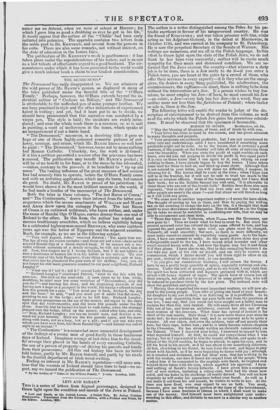THE DENOUNCED.*
The Denounced has sadly disappointed us. We are admirers of the wild power of Mr. BANIM'S genius, as displayed in many of the tales published under the fanciful title of the " O'Hara Family." Perhaps, however, the O'Hara extends beyond the in- dividual author of " Crohore na Billoge," and The Denounced is attributable to the unfleshed pen of some younger brother. We are long practised in style and the other indications of experienced talent in writing ; and yet, had it been put to us to decide, we should have pronounced that this narrative was conducted by a virgin pen. The style is bald ; the incidents are rudely intro- duced; and over the whole work there is a rawness, or, as is said in painting, a want of mellowness in the tones, which speaks of an inexperienced if not a feeble hand. " The Denounced," moreover, is a deceiving title : it gave us hope of one of those highly-coloured romantic pictures of out- lawry, courage, and crime, which Mr. Bt IM knows so well how to paint : " The Denounced," however, turns out to mean nothing but Roman Catholic. Unluckily, too, the work is ill-timed ; it is like a petition presented a session after the grievance has been rmoved. The publication may benefit. Mr. BANIM'S pocket ; it will be of no benefit to his fame, or to the cause he has advocated, —unless, contrary to the proverb, it be beneficial to " rip up old sores." The healing influence of the great measure of last session has had scarcely time to operate, before the O'Hara Family come out with an irritating application, which may do harm, but cannot do good. No doubt, Mr. BANIM is proud of his patriotism : he would have shown it in the most brilliant manner in the world, if he had made a bonfire of the manuscript of The Denounced. . Both the tales in these volumes, "The last Baron of Crana," and " The Conformists," derive their interest from the bitter con- sequences which the severe enactments of WILLIAM and MARY and ANNE drew. upon :the unhappy Papists. The last Baron of Crana is an outlawed nobleman, who turns robber, and,-under- the name of Randal Oge O'Hagan, carries dismay from one end of Ireland to the other. In this form, the author has related nu- merous traditionary anecdotes, which we believe rightfully belong to a celebrated, highwayman named BRENNAN, who some eighteen years ago was the terror of Tipperary and the adjacent counties. Such, for example, as we see in the following extract. " Very well argued, John,' resumed Patrick ; Yet again hear me. The lips of even his sworn enemies—and those are not a few—have never accused Randal Oge of a blood-stained hand. If he cannot rob a tra- veller without certainty of a deadly struggle, he will not attack him at all. Now, God forgive me if I wrong Gernon, but I do not believe so nice a daintiness of human life is in his habits or his nature. 'Tis also certainly said of the bold Rapparec, if any thing is certainly said of him, that never has he plundered the poor man of his shilling. Nay, you do not forget his still more generous conduct to our poor neighbour, Richard Langley ?'
" What was it ? tell it ; tell it !' craved Lady Dorcas.
" Richard Langley ?' continued Patrick, went to the fair with his own cow. She died on the road-side. A man came up to him, while, doubtless, he cried over her some variation of "Drimendhoo, why did you die ?"—and hearing his story, and his despairing avowals of not having now a hope or a prospect in the world, the stranger offered to lend him five pounds for a year. • You must pay it back, Richard, the day and the hour," he said, " and you must put it under this flat stone," pointing to one in the hedge ; and so he left him. Richard Langley, again grown prosperous on the use of the money, did repair to the same spot that day twelvemonths, and did leave five pounds under tl.le flat stone. Scarcely had he turned his back to walk home, when the stranger jumped over the hedge, lifted up the money, called after him, and said, —" Stop, Richard Langley ; you are an honest man, and deserve a re- ward for your honesty. Here are the five pounds again, and five more along with them, not as a loan, but as a gift ; and if any one asks you whom you have seen here, tell them Randal Oge"—and Randal was out of sight in an instant.' " "The Conformists" is a somewhat more successful development of the feelings of a young man of good family in those barbarous days of Ireland. Imaginary wrongs at last drive him to the dread- ful revenge then placed in the hands of every recanting Catholic, the son of a person of property—of driving his parents and family from their possessions. All this sad history has been far better told before, partly by Mr. BANIM himself, and partly by his rivals in the fruitful department of Irish novel-writing. Feeling an interest in Mr. BANIM'S reputation—still more anx- ious that the wounds of Ireland should have time to heal—we re- gret, nay we lament the publication of The Denounced. * By the Author of " Tales of the O'Hara Family." 3 vols. London, MO.


























 Previous page
Previous page